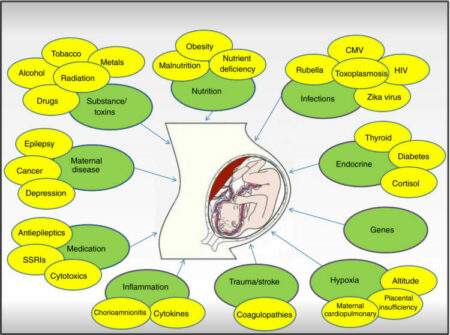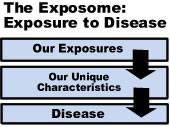Part 4: Planetary Health Impact on Humans
16 Human development and health from a planetary health perspective
Montelpare, W.
Learner Outcomes
After reading this chapter the reader should be able to:
- Provide a definition of human development from a variety of perspectives
- Understand the effect of human development on Planetary Health
- Understand the effect of Planetary Health on human development
Key Words
Type your key takeaways here.
- human development
- bioecological model
- phenotypic influences
What is Human Development?
-
- Is human development specifically fetal growth resulting from environmental conditions that influence the intrauterine development of the fetus (Olusanya, 2010; Eriksson, 2005)?
-
- Does human development refer to the physical and intellectual growth within the human species that is measured in metrics which can include but is not limited to body mass indices and cognitive achievements (Dordic, Tubic, and Jaksic, 2016)?
-
- Is it a function of the interaction of societal influences as described by Developmental Systems Theories (Osher, Cantor, Berg, and Steyer, et al, 2020) where such theories describe the relationships which exist between environment and societal structure?
-
- Is human development generational and reflective of local cultural pressures and the interaction that an individual has with proximal processes[1] as suggested by Bronfenbrenner’s bioecological model (Ashiabi and O’Neal, 2015)?
-
- Is human development an achievement that is demonstrated by economic growth
-
- Is human development a score based on a sustainable development index despite negative influences on climate change, biodiversity loss, chemical loading (nitrogen and phosphorous), and land-system change (Hickel, 2020; Biggeri and Mauro, 2018)?
The answer is that human development is all of the above and more!
Let’s begin this conversation by suggesting that human development is multidimensional[2].

With specific regard to planetary health, research indicates that human development is not only impactful on planetary health but the development of humans is impacted, often adversely, by our pursuit of advanced development. Phenotypic responses, defined as the impact of the environment on the human genome, show that fetal development is negatively influenced by poor planetary health.
For example, research by Coussons-Read (2013), Glover (2011), and Mastorci, Vicentini, Viltart, and Manghi et al (2009) showed that stress during pregnancy can have adverse health consequences throughout the lifespan including but not limited to cardiovascular disease, lack of neurodevelopment, and negative behavioral and cognitive outcomes.
In addition to our self-imposed adverse environmental stresses such as the effects of cigarette smoking on the fetus, pregnant mothers are also at risk from uncontrollable environmental stresses such as:
- extreme weather events,
- food insecurity,
- exposure to contaminated water
- and most notably exposure to contaminated air (Triche and Hossain, 2007)
To this list we can also add the adverse social situations which propagate adverse childhood experiences that have a direct effect on human development and long term health (Gentner and O’Connor-Lepert, 2019) [3]. 
Similarly, human development is impactful on planetary health as we have seen throughout the Anthropocene.
The list of negative human health consequences resulting from our deterioration of planetary health is growing well beyond the climate-sensitive physical health risks noted by Mailloux, Henegan, Lsoto, Patterson et al (2021) as “heatwave mortality, malnutrition from reduced crop yields, water- and vector-borne infectious diseases, and respiratory illness from smog, ozone, allergenic pollen, and wildfires”. Given that health is a Gestalt comprised of social, mental, physical, spiritual, and emotional elements, that together form the well-being of our human species, we cannot discount the effect of planetary health on the composite of human health. In March 2019, the United Nations global human development program published a Guidance Note that provided direction with regard to planetary health and human health. In this guidance note Jon Hall and Midori Paxton report that planetary health, and specifically biodiversity, are linked directly to human development and subsequently human health.

Humans, despite their best intentions, have for the most part destroyed the biodiversity of our planet and therefore continue to have a direct negative impact on the capacity to maintain a healthy human civilization. The report by Hall and Paxton outlines the loss of biodiversity over the past xxxx years and the subsequent impact of such destruction on the constituents of the biosphere upon which human civilization depends. Air, water, land management, and food security, are all essential to maintaining a healthy human civilization. However, in our pursuit of human development we ignored many of the elements that make earth diverse and which provide for us as a human species.
Planetary health and human development considered either independently or combined, represent a wicked problem. That is, human development is messy it is complicated and it creates complex outcomes which cannot be resolved simply and especially when we have directly impacted the species upon which we depend. For example, there have been several reports of the loss of our pollinators as a result of our loss of biodiversity. Combine these losses with the effects of drought and severe intense heat in our environments and it is no wonder that we are becoming a planet that is food insecure for much of our civilization. We cannot continue to maintain adequate food sources for the world if we continue to destroy the biosphere through our wilful social and economic development which are often based on wasteful practices, human greed, and of course war.
The future is Now!
EXPOSOMES — and the relation to phenotypic effects.

https://www.cdc.gov/niosh/topics/exposome/default.html
Information for Bibliography
Olusanya, B.O., (2010) Intrauterine growth restriction in a low-income country: Risk factors, adverse perinatal outcomes and correlation with current WHO Multicenter Growth Reference, Early Human Development, Volume 86, Issue 7, Pages 439-444,
ISSN 0378-3782, https://doi.org/10.1016/j.earlhumdev.2010.05.023.
Eriksson J. G. (2005). The fetal origins hypothesis–10 years on. BMJ (Clinical research ed.), 330(7500), 1096–1097. https://doi.org/10.1136/bmj.330.7500.1096
Đorđić, V., Tubić, T., Jakšić, D., (2016) The Relationship between Physical, Motor, and Intellectual Development of Preschool Children,
Procedia – Social and Behavioral Sciences, Volume 233, Pages 3-7,
ISSN 1877-0428, https://doi.org/10.1016/j.sbspro.2016.10.114.
Osher, D., Cantor, P., Berg, J., Steyer, L., & Rose, T., (2020). Drivers of human development: How relationships and context shape learning and development, Applied Developmental Science, 24:1, 6-36, DOI: 10.1080/10888691.2017.1398650
Hickel, J., (2020). The sustainable development index: Measuring the ecological efficiency of human development in the anthropocene,
Ecological Economics, Volume 167, 106331,
ISSN 0921-8009, https://doi.org/10.1016/j.ecolecon.2019.05.011.
Biggeri, M., Mauro, V., (2018) Towards a more ‘Sustainable’ Human Development Index: Integrating the environment and freedom,
Ecological Indicators, Volume 91, Pages 220-231,
ISSN 1470-160X, https://doi.org/10.1016/j.ecolind.2018.03.045.
Coussons-Read M. E. (2013). Effects of prenatal stress on pregnancy and human development: mechanisms and pathways. Obstetric medicine, 6(2), 52–57. https://doi.org/10.1177/1753495X12473751
Triche, E. W., & Hossain, N. (2007). Environmental factors implicated in the causation of adverse pregnancy outcome. Seminars in perinatology, 31(4), 240–242. https://doi.org/10.1053/j.semperi.2007.07.013
Gentner, M.B., & O’Connor-Leppert, M.L., (2019) Environmental influences on health and development: nutrition,
substance exposure, and adverse childhood experiences (Invited Review). Developmental Medicine & Child Neurology , 61: 1008–1014 DOI: 10.1111/dmcn.14149
Mailloux NA, Henegan CP, Lsoto D, Patterson KP, West PC, Foley JA, Patz JA. Climate Solutions Double as Health Interventions. Int J Environ Res Public Health. 2021 Dec 18;18(24):13339. doi: 10.3390/ijerph182413339. PMID: 34948948; PMCID: PMC8705042.
- Bronfenbrenner's Biological Model describes proximal processes as the activities in which an individual learns through engagement with people, environments, or items. ↵
- Image Source for Figure 1 -- https://hdr.undp.org/en/file/what-human-development ↵
- Image Source: Develop Med Child Neuro, Volume: 61, Issue: 9, Pages: 1008-1014, First published: 22 January 2019, DOI: (10.1111/dmcn.14149) ↵

